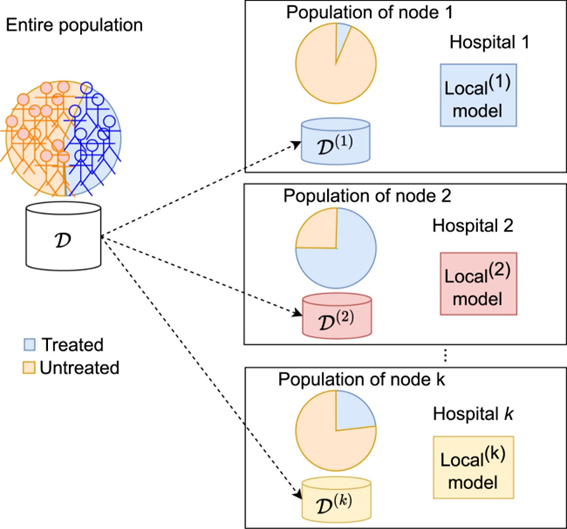Federated learning to reduce bias in medical treatment estimation

A team of researchers from the Escuela Técnica Superior de Ingenieros de Telecomunicación (ETSIT) at the Universidad Politécnica de Madrid (UPM) has developed an innovative approach to estimating the effects of medical treatments. Randomised clinical trials are currently the most reliable tool for assessing the impact of a treatment, as they divide patients into two random groups, assigning a different treatment to each. However, this procedure can be slow and subject to ethical constraints, which limits its applicability in certain medical contexts.
To address this limitation, researchers from the Information Processing and Telecommunications R&D Centre (IPTC), affiliated with ETSIT, have turned to an approach that combines artificial intelligence, causal inference, and observational (non-randomised) data to estimate treatment effects. Nevertheless, estimating treatment effects from observational data presents multiple challenges, such as the presence of biases in treatment assignment. For instance, if a treatment is predominantly administered to a group of patients with a poorer prognosis, its effects may appear less favourable—not due to the inefficacy of the treatment itself, but because of the more severe initial condition of those patients.

The study addresses the problem of distributed causal inference in hospitals, since medical data are often spread across different centres, each with varying patient distributions and treatment assignment criteria. Due to privacy constraints, patients’ personal data cannot be shared between hospitals, which complicates accurate estimation of treatment effects.
To tackle this challenge, the researchers have developed an adaptation of one of the most advanced neural network-based architectures for treatment effect prediction. According to the experiments conducted, this adaptation—called Propensity Weighted Federated Averaging—corrects the imbalance in treatment distributions across hospitals, thereby improving the accuracy of individual causal effect estimation. “What we have achieved with our work has important implications for the field of medicine, as improving the estimation of medical treatment effects is a step forward in evaluating therapies in resource-limited hospitals without violating patient privacy,” says Santiago Zazo Bello, professor at ETSIT and one of the researchers involved in the study.
The study also highlights the need to incorporate advanced privacy-preserving techniques—such as differential privacy and encryption—to ensure compliance with the strictest privacy regulations. The researchers plan to continue exploring these techniques in future work.
Ultimately, “the algorithm we have developed represents a significant step forward in improving treatment effect estimation in distributed and imbalanced environments, with potential benefits for medical research and public health decision-making at a global level,” they conclude.
Bibliographic Reference: Alejandro Almodóvar, Juan Parras, Santiago Zazo. Propensity Weighted federated learning for treatment effect estimation in distributed imbalanced environments. Computers in Biology and Medicine, Volume 178, 2024, 108779, ISSN 0010-4825.
https://doi.org/10.1016/j.compbiomed.2024.108779
https://www.sciencedirect.com/science/article/pii/S0010482524008643
Source: ‘e-Politécnica Investigación e Innovación’ (nº 730), boletín de la UPM, publicada en su fuente original el 12.02.2025
Royalty-free image: www.freepik.es
Share this:
Latest news



Categories

